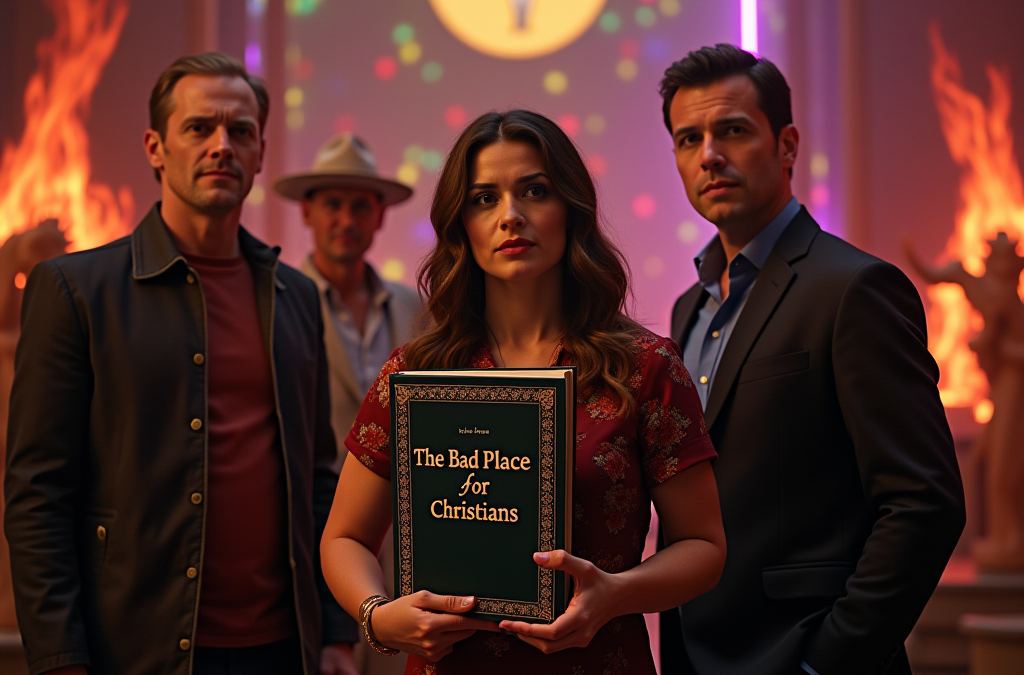
The Talmud and Judeo Influence in Christianity and Global Politics: A Dangerous Mix
December 2, 2024“The Good Place” is a popular American television series that originally aired from 2016 to 2020. While the show has been praised for its unique premise, clever writing, and thought-provoking themes, it presents several challenges and concerns for Christians who engage with its content. This blog post will explore the reasons why “The Good Place” is a problematic show for Christians, grounding our analysis in the teachings of the Bible, specifically using the King James Version (KJV) as our primary reference. We will examine the show’s depiction of morality, the afterlife, and the nature of human beings, drawing upon relevant scriptural passages to highlight potential issues and inconsistencies with Christian doctrine.
- The Show’s Premise and Morality
“The Good Place” revolves around the concept of morality and the question of what constitutes a “good” person. The main character, Eleanor Shellstrop, finds herself in the afterlife and realizes that she has been assigned to the “Good Place,” a paradise for the righteous, despite her less-than-perfect moral record in life. This premise raises several concerns for Christians.
Firstly, the show’s depiction of morality is not grounded in a clear, objective standard. Instead, it presents a subjective and relativistic view, where what is considered “good” is determined by individual actions and intentions. In contrast, the Bible teaches that morality is rooted in God’s unchanging character and His eternal standards (Psalm 19:7, Romans 2:14-15). God’s Word is the ultimate authority on what is right and wrong, and it is not subject to human interpretation or personal opinion.
Secondly, the show’s focus on the individual’s moral choices and intentions overlooks the importance of faith in Christ. The Bible makes it clear that salvation and eternal life are not earned through good works but are a gift from God, received by faith in Jesus Christ (Ephesians 2:8-9, Romans 4:4-5). “The Good Place” suggests that people can earn their way into paradise through their own efforts, which contradicts the Christian doctrine of salvation by grace through faith.
- The Nature of the Afterlife
“The Good Place” presents an imaginative and humorous vision of the afterlife, complete with soulmates, an afterlife version of Earth, and a sort of cosmic accounting system. While the show’s creative take on the afterlife can be entertaining, it raises concerns for Christians.
Firstly, the show’s depiction of the afterlife is not based on biblical teachings. The Bible describes two distinct destinations after death: heaven and hell (Matthew 25:46, Revelation 20:14-15). In “The Good Place,” the afterlife appears to be a one-size-fits-all paradise, with no mention of judgment or the reality of hell. This omission is concerning, as the Bible makes it clear that hell is a real place of eternal punishment for those who reject God’s offer of salvation (Matthew 10:28, Revelation 20:10).
Secondly, the show’s portrayal of the afterlife suggests that people can improve their eternal destiny through their actions and choices in the afterlife. In one episode, the main character’s soulmate is sent to a lower level of the afterlife because of her past mistakes, implying that people can work their way up to a better afterlife through personal effort. This idea contradicts the Christian teaching that once a person dies, their eternal destiny is sealed (Hebrews 9:27). The Bible is clear that the only way to avoid the wrath of God and enter into His presence is through faith in Jesus Christ (John 14:6, Acts 4:12).
- The Nature of Human Beings
“The Good Place” presents a flawed and flawed view of human nature. The show’s characters are often shown as being dishonest, selfish, and motivated by their own interests rather than the greater good. While this portrayal may be a reflection of the human condition, it raises concerns for Christians.
Firstly, the show’s view of human nature is in contrast to the biblical understanding of human beings as being made in the image of God (Genesis 1:27). Although sin has marred God’s image in humanity, Christians believe that every person still possesses the capacity for goodness and the potential to reflect God’s character. The Bible teaches that people can choose to live according to God’s standards and that the Holy Spirit can transform their hearts and minds (Romans 12:2, 2 Corinthians 3:18).
Secondly, the show’s portrayal of human nature overlooks the transformative power of the gospel. The Bible teaches that through faith in Jesus Christ, believers can experience a radical change in their hearts and lives (2 Corinthians 5:17, Galatians 2:20). “The Good Place” does not present a solution for the problem of sin and human brokenness, leaving viewers without hope for true change and redemption.
While “The Good Place” may offer some thought-provoking discussions about morality and the afterlife, it presents significant challenges and concerns for Christians. The show’s depiction of morality, the afterlife, and human nature are not consistent with biblical teachings, and its portrayal of salvation through personal effort contradicts the Christian doctrine of salvation by grace through faith.
For Christians, it is essential to approach shows like “The Good Place” with discernment and a commitment to upholding God’s Word as the ultimate authority on these matters. We must be prepared to engage with difficult questions and challenges, grounding our responses in the truth of the Bible and pointing others to the hope found in Jesus Christ (John 14:6, 1 Peter 3:15).
In conclusion, while “The Good Place” may be entertaining and thought-provoking, it is a troubling show for Christians to watch due to its inconsistencies with biblical teachings. We must be diligent in our discernment and commitment to the truth of God’s Word, trusting in the power of the gospel to transform lives and offer true hope and redemption.




